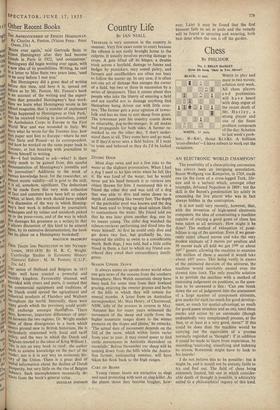AN ELECTRONIC WORLD CHAMPION?
The possibility of a chess-playing automaton 'has always been an intriguing speculation. Baron Wolfgang von Kempelen, in 1769, made one (in the form of a cross-legged Turk, life- size and in a turban) which, amongst other triumphs, defeated Napoleon in 1809: but the skill in the Baron's Fonstruction lay solely in concealing the live player who was in fact always hidden in the contraption.
It is not until very recently, however, that, with the invention of high-speed electronic computers, the idea of constructing a machine capable of playing a good game of chess has been taken at all seriously. How might it be done? The method of exhaustion of possi- bilities is out of the question. Even if we gener- ously reject absurd moves and take the very modest estimate of 3 moves per position and 50 moves each all told we get 3100 or about 1047.7 games; allowing the machine to examine 100 million of these a second it would take about 1032 years. This being vastly in excess of the estimated duration of the universe, the machine would inevitably exceed even the slowest time limit. The only possible solution is to provide the machine with a method of exercising judgement on positions, so the ques- tion to be answered is this : 'Can one break down the act of judgement into the assessment of a large number of component elements, give marks for each (so much for good develop- ment, so much for spatial'advantage, so much for good pawn structure and so on), total these marks and arrive by an automatic (though undoubtedly very complicated) process, at the best, or at least at a very good, move?' If this could be done then the machine would be carrying out the equivalent of a process normally regarded as 'thought': if in addition it could be made to learn from experience, by recording, analysing, classifying and indexing its errors, Botwinnik might have to look to his laurels!
I do not believe this to be possible: but it might be, and it would not be entirely futile to try and find out. The field of chess being extremely limited, but one in which consider- able depth of thought is possible, is admirably suited to a philosophical inquiry of this kind.


































 Previous page
Previous page